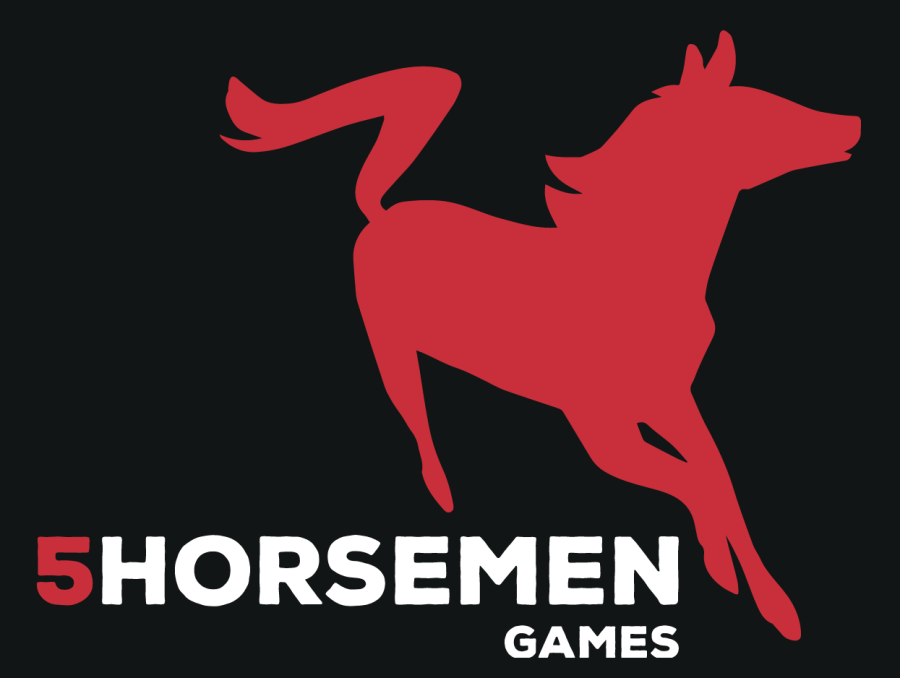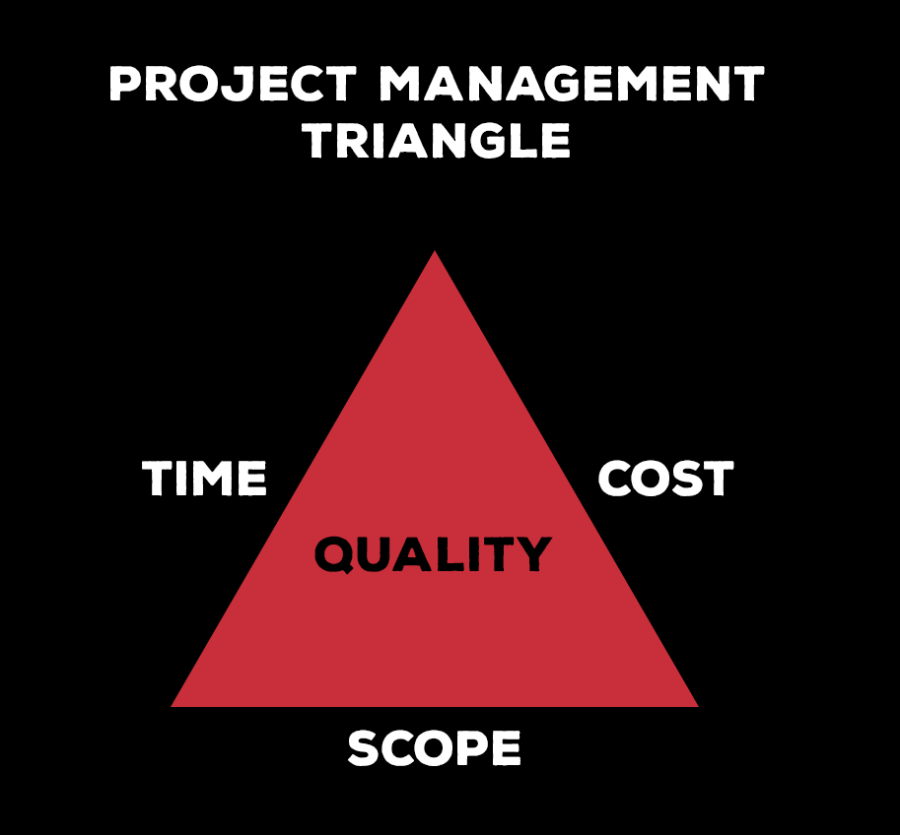
Designed by: Filipe Seabra & Katherine Elliott
Hello! I’m Danielle Rainey and I’m a fourth year Game Design student currently working on an eight month game design / development project. Will I be working alone through this adventure? No way! My super talented team entitled the 5 Horsemen have set off to create a narrative driven platformer game where the player and her companion must navigate environmental puzzles to travel from point A to point B. My roles will be the following: Producer, Project manager, Lead UX designer, 3D Generalist, and Marketing management.
DISCLAIMER: I am not a game designer.
I AM in a game design degree, I HAVE been studying game design for the past three years, but by no means do I plan on solely pursuing game design as a career. I enjoy the role of project manager and game producer and I’d like to further develop my skills in this area, these are the main roles that these dev logs will focus on.
Producer vs. Project manager: The Struggle
The following is my educated opinion on the matter of game producers vs. game project managers and my view on merging the roles. I personally feel the roles are more beneficial to the team when separated.
A good producer is a problem solver, they bring their team to greatness, they’re the source point of communication, they make sure everyone in the team has what they need and know what they need to know to do what they need to do. My belief is, Game Producers must be emotionally invested in seeing their game ship, while not being too emotionally invested in the game itself.
A project manager is more administrative, they ensure the project scope and budget fit the schedule. They adhere to things like the Project Management Triangle and use task management and tracking software like Excel or Wrike. They remind and check in with team members to make sure all deliverables are being met and that everything that needs to be done is getting done. Unlike producers, project managers are not interested in how tasks are completed, just that they are in-fact complete.

There is no right answer to the question of “Should a game producer also be a game project manager?” because it really depends on the needs of the studio. In this project I am both these positions, it is so extremely difficult to find a happy medium between the two, I would strongly recommend for anyone reading this who feels they should take on both roles for a game project, don’t. You will feel like Dr.Jekyll and Mr.Hyde and will put your team through an emotional roller coaster ride, one minute your hyping the team up to push them through their sprint and the next minute your straight faced and only focused on tasks being completed. Through future dev log updates I will be updating my current mental and psychical state while attempting to balance these crucial roles.

Communication, it’s essential to building a strong team and an even stronger experience. One of my main and arguably most important roles as a producer is making sure that every member of my team is able to express their thoughts and that their views will be understood by all team members. Assuming your team shares the same first language, has similar educational backgrounds, and have worked together for years, in theory sounds like communication would come naturally, this of course is wrong.

In my case my team and I have been working together for years and are all very close friends, we often spend weekends together and generally enjoy each other’s company outside the studio. All this time spent together should allow us to have very little communication problems, yet we’re still plagued with the typical “misunderstandings” found in even the most experienced teams. For example, in one of our meetings we were discussing if our main character should ever encounter an NPC in the world that she’s exploring, we all agreed that she should.
One member suggested that since this is a puzzle game and the player has been practicing using her abilities throughout the game, this could be a great opportunity to put her powers to the test. It was suggested that this NPC would act as a “Boss” which the player must fight and defeat. Immediately the idea was shot down, and for what seemed like good reason. We would then need to develop an entire combat system for one fight scene, combat UI, a character health system, intense fighting animations, the list continued and the member who suggested the sunk back and let their silence act as agreement, the meeting continued.
Now I don’t claim to be perfect at the role of producer, in fact I find the role does not come naturally to me at all and it’s something I must be proactively trying to improve on. In this moment I should have asked the team member to further explain what they meant by “boss battle” but instead I hastily agreed with the cons and chose to not further examine this possible feature. It wasn’t until a few hours after the meeting where I was thinking how many different kinds of boss battles there are, I then asked the team member to explain their idea to me a little more and it didn’t take long to realize they didn’t mean boss battle at all, what they were describing was an environmental puzzle with an NPC acting as an enemy. The player never directly interacted with the boss, the animations primarily stay the same, UI doesn’t change, this scene would really just be a larger more hazardous puzzle.
Boss battle examples from Brothers: A Tale of Two Sons, Papo & Yo, and Conker’s Bad Fur Day, all showing the same boss battle mechanic where the player uses the environment to “defeat” the boss while avoiding any contact.
This misunderstanding led me to think of all the other ideas that had been turned down by one member or another and how broad these terms really are, “boss battle”, “platforming”, “puzzle”, these were all very ambiguous terms and they were topics that were constantly being brought up. I then asked every member to create a short slideshow showing similar game examples of what it is they are envisioning. As I predicted these visual examples allowed us to realize one person’s idea of platforming or puzzle completion was not the same as others. Luckily my team and I were proactive when coming up with our initial capstone idea and we started our design process 5 weeks early, I’m extremely thankful that we did as it allowed us to flush out much of our early level design miscommunication and begin to develop syntax that we use when referencing certain features in our game.
Platforming examples from Brothers: A Tale of Two Sons, A Story About my Uncle, Super Mario Sunshine, showing just a few examples of platforming styles in games.
With clear game examples representing everyone’s predisposed idea on key terms and game features we were able to collectively get on the same page. As I continue to learn how to be a game producer I’ll need to regular work on my own ability to communicate both verbally and non-verbally with my team as well as making sure that all team members communicate and understand each-other’s thoughts and opinions.
The Project Managers Toolbelt
Managing tasks and deliverables for my capstone team is a responsibility I both enjoy and dread. I have always been a very organized and prepared individual who has loved the challenge of being project manager for other small scale projects in the past. With the capstone being an eight month project the amount of planning and organization thats required is much greater and therefore significantly more stressful. How can I manage some of this stress? By using some of the tools found on todays project managers tool belt!
Tool One: Google Calendar
One of the first issues I came across was my attempts to plan and book regular meetings for all team members to attend, this of course is very difficult when you are unaware of your team members personal lives and schedules. This is where Google Cal came in, I needed a way to allow myself and all team members to see each others whereabouts Monday – Friday. This is where Google Cal came in, I compiled a list of the mandatory classes / meetings we were all required to attend and transferred that onto an individual calendar. Next I created another individual calendar and recorded the dates and times of my role specific mentorship meeting. I then walked through that some process with each team member allowing them to create an individual calendar showing their role specific mentorship meetings. Once this was completed every team member shared this individual calendar with each other as well as I shared the required classes calendar and voila all team members could now see where everyone would be during the work week! This system allowed me quickly see which days and times worked best for all team members when it comes to having meetings, and this method is very adaptable to everyones personal Google cal as each calendar is a separate layer and can be easily toggled on and off.

Tool Two: Slack
My team and I had started working on our capstone project about six weeks early which meant I had needed to set up a means of communication. We all agreed we wanted to avoid using Facebook chat and liked the idea of having all our capstone related conversations in one designated location. This lead me to set up a Slack account for our team as well as create multiple channels for areas such as art, level design, inspiration, etc. Once all members had registered we were able to use Slack to contain our work conversations in one designated location and its cross platform accessibility made it easy to use on both mobile and computing platforms.

Unfortunately this didn’t last as long as I had hoped, since we are still students and this capstone is being treated as a school assignment vs. an actual studio production some major changes needed to happen. Once September rolled around the faculty set up a Slack for our entire program and required each team to create a channel and to use this channel as your teams means of communication as it would allow the faculty to be involved in your team. I of course obliged, which meant deleting our teams domain and all the channels within it.
Now my team cannot use Slack to its fullest as we have lost the ability to have multiple channels each designated to specific areas within the team. I feel I can make this claim because I’ve been apart of a video game studio who uses Slack and they have channels designated to areas such as art, design, meetings, silly office photos, etc and I feel this really utilizes Slack to its fullest. With that said, my team is using Slack and we do feel its a great tool for communication.
Tool Three: Wrike
This software has to be one of my all time favourite tools thus far and arguably my best friend as a project manager. One of my key responsibilities is setting milestones and deliverables for my team. On a micro scale using Google Cal to help visualize these dates was helpful at first, but I soon realized with every team member working in tandem it was getting very complicated as to who was doing what and when that task would be completed. More importantly some tasks required multiple team members involvement, which meant there needed to be an order as to who was working on which section of the project and this order needed to be made visible to all members.
For example, my coder plans on having character movement done on X day at X time, and he schedules this task on Wrike allowing me to see his current plans. I know that he will need character animations before he is able to finish that task since he specifies that this task will be using root-motion. Next I see my level designer (who is also the character animator) has scheduled himself to work on an art prototype and he will be focusing his time on the development of environment art. Immediately a red flag goes off because I can see that one team member will need animations from another team member and they are unaware that their current task schedule does not work together. Here I come in and ask both members to discuss their current goals and how they can make sure any work that required collaboration gets done before individual work is completed.
One of the reasons I love Wrike so much is it allows me to see what every team member is working on, which helps me limit miscommunications or overlooked tasks. Wrike allows me to create projects that only specific team members can see which helps lower visual clutter, as well as it offers an array of visual feedback options such as text charts, graphs, task lists, and my personal favourite, gantt charts. As the project manager nothing makes
me more pleased then seeing every team member woking in tandem on both individual and collaborative tasks, and that these tasks are being completed on time. If a task wasn’t to be completed my a team member on the date they were assigned I as the admin receive notifications alerting me to missed deadlines which allows me to monitor that task and make adjustments to scope and timelines accordingly.
It’s Not Easy Being the Bad Guy
Have you ever managed a team of people? It’s not easy. Everyone in your team excels in one category or another, their all wall versed in a multitude of disciplines, their usually confident about what they do, and sometimes cocky about how they do it.
When you take on the role of producer or project manager (or worse, in my case both) you have to acknowledge the path ahead of you will be filled with bumps and unexpected curves that will constantly test your skills and limitations.

You have to agree to late hours, long days, and overtime, because you need to be able to pick up the slack when need be, or find a team member who can.
You need to accept that the beautiful fool proof schedule that feels like it took a year to develop, with all its contingencies and perfect tandem team pipelines are bound to change.
You need to realise you’re not a superhero, you’ll never understand everything that’s going on in every team members mind, personal life, or work life.
You need to know when to admit you’re wrong. Yes it is your job to make sure everything is moving in a forward direction, that you’re achieving goals and milestones, but if you’ve set a milestone pre-maturely or too far ahead, then you need to recognise that fault.
You need to be able to separate your personal life from your professional role. This is easier said than done.
Nobody wants to work with their enemies. Most individuals want to work with a talented team who’s friendly, easy to talk too, and comfortable to be around. More often than not these coworkers become your friends and confidants. Now you have just inadvertently made your job 10x more difficult, if you thought it was a challenge to manage strangers try managing your friends. This kind of position can lead to overestimation of a team member’s capabilities due to the fact that you feel so confident in their efforts and abilities. You know how talented they are and you have no doubt that they will succeed and whatever you throw at them, this of course is wrong.
If your team is burning out, it’s your job to say “stop”.

To step back and really look at the path you’ve set. Did you over scope? Did you and your team overestimate their abilities? Did you allow the schedule the reflect that? Was there unexpected event that caused your team’s workflow to become askew? If you can relate with any of these situations then you can likely relate to being a management position. You’re not perfect, and no matter how extremely eye-bulging-gut-wrenching-brain-bogglingly talented your team is, they’re not perfect either. People get sick. People get tired. People get unengaged. People get hurt, physically and emotionally. We are people, and we have to understand our limits. And if you’re the producer then you have to not only understand your team’s limits, but your own limitations as well.
Dr.Jekyll and maybe not so Mr.Hyde
With pre-production over I’ve officially had four months experience as my team’s producer and project manager. At first I found the combination of the two jobs very conflicting and mentally draining, but I have begun to warm up to the hybrid position. At first my view towards these roles where black and white, in a sense binary. I could not see the roles working in tandem nor in parallel. I felt I need to put on hat on work as the PM until schedules were complete, take that hat off and re-apply the producer hat. I have since then changed my view, now I see it as constantly wearing a large producer hat with a small PM hat underneath. Both jobs needs to happen, and often they line between them is so blurry it’s hard to distinguish where one role starts and the other ends.

After doing some reflection I believe a portion of my mental discomfort is the lack of positive attitude and empathy. When I for fulling the role of PM I feel I can be more direct and overt about time lines, scope, cost, everything that needs to be taken into account to ensure we have the amount of time and power to complete our goals. I felt I could be more “myself” because I needed to inform the team of logical facts that were not so much my opinion but were realistic estimates. Then I would switch to the role of producer and feel I needed to be very upbeat, energetic, positive, and ready to cheer the team on and boost morale. This is really out of my character.
Where it Gets Complicated
So the lines between project manager and producer are pretty blurry, and a lot of the tasks given to both positions are heavily intertwined, this I have come to terms with. Were I now draw the line is holding a full time producer / PM role as well as being heavily involved in another side role. In my case, I am the only one assigned to work on our quadruped character, Killian the bear, and by no means so I ever want to be a full time rigger or animator in the future. As it stood no one on my team wanted to pursue a future in animation and we were lucky enough to utilize mocap to create almost all of our bi-ped characters animation which really saved us a lot of time. Since we could not use such technology on Killian I spent 3-4 weeks rigging and animating this character. When I (the project manager) schedule the animator (myself) 1 week to complete x number of poses, I expect that individual to complete that task. I’ve been the lead animator on past projects and I knew how long it takes me to complete these types of poses, when I failed to conciser was the fact that I’m unable to simply sit down and animate without interruptions.
On this team my primary role is producer, followed closely by project management, (arguably third in line is Community Management but that’s a whole other topic). This means I can loose full days when I see a part of the pipeline is falling behind and the schedule needs adjustments, or when unexpected opportunists presents itself forcing me to focus on my primarily roles. After experiencing the exhausting effort it takes to juggle these three positions I’m now a strong advocator of keeping the administrative roles separated from other aspects of the pipeline, in my case animation.

Over the last three weeks I’ve watched many videos on GDC as well as reading a PM book and speaking with current industry professionals on their opinion of individuals who are both a producer and project manager. Through there was no cut and dry consensus it does look like this hybrid role is seen as a positive in the indie game scene. With this viewpoint I began to make a more conscious effort at being an “all-round better person.” I’m actively listening to what everyone has to say, be that about aspects within their personal pipeline or otherwise. I’m less quick to jump to conclusions, for example when an idea arises that either doesn’t work with our current mechanics or there simply isn’t enough time, I ask why that individual was so inspired by that ideas and what is was exactly that they liked about it. As well has conducting a postmortem to sum-up the first half of our semester, this allowed my team to list both positive and negative outcomes and how we could improve on those areas this semester.

I believe I have a lot more to learn about juggling both roles while working in the indie game scene, and I look forward to these learning opportunities to improve my ability in being a game project manager.
My conclusion / beginning.
It’s been a long four years that felt like 4 minutes. I’ve had my fair share of ups and downs, I’ve made mistakes and I hold regrets. If I could go back in time and change ways I went about solving a problem or spent a little more time re-assessing what tasks in my life need prioritizing, I would of course change some things. With that said, I’m glad I’ve made mistakes as I feel I’ve grown from each one, and I constantly find myself bringing this “mistake” up in conversation as examples of why I do or don’t agree with the direction my current project is heading. As a student were expected to learn and bring this knowledge with up as we progress, I can say with certainty that I have been, and will continue to, use what I’ve learned in my work as a project manager within the game industry.

As we wrap up our capstone projects and begin seeking employment in our chosen fields I feel this is the perfect time to step back and reflect on our current progress. I feel overwhelmed by the amount my team as accomplished and am proud to call myself the producer and project manager of our game titled Unspokin. We knew this would be one of our most ambitious projects any of us have taken-on, but this was our last time to really take a risk and really push ourselves both individually and as a team. The decision to create a seemingly open-world / 3D / companion adventure game with advanced AI, beautiful aesthetics, and a deep level of design, is a lot to say the least. With full knowledge that our manpower would be capped at 5 individuals, and our time dedicated towards this projects was roughly 25 hours a week for 7 months, we certainly tested ourselves through this project.

@5horsemengames
http://www.5horsemengames.com
I feel our hard work has paid off as my team has been invited to show our game at Ubisoft Toronto, this has really pushed my teams to ensure all aspects of gameplay that were scheduled to complete are in fact completed. As well as pushing to implement certain art aspects ahead of time in order to gauge the most feedback from these industry professionals as possible. Not only have we been invited to demonstrate our game at Ubisoft, but we’ve recently demo’s at Hamilton’s Game Dev drinks and Uken’s Unity Meetup. These public events have allowed us to gauge much player feedback on our current progression and allow us to ask and answer questions with our target audience. Moving forward our game Unspokin has also been selected to showcase at Level up 2017 and Digifest 2017, both being large Toronto based showcase events which will drive much foot traffic and word of mouth around our game and my team.

Since we do not have a dedicated community manager I have taken it upon myself to cover this role as well as being the producer and project manager. I feel the role of community manger is essential to the initial growth and continual development for any game company, specifically indie games. Throughout the production of our capstone game I’ve ensured we keep strong online and social presence in order to build brand awareness and grow our audience relations. Attending events such as Game Dev drinks and Uken’s Unity Meetup really help us improve our game so we can compete at showcase events such as Level up and Digifest. As the producer I want our game to be recognised at local venues and we’ve already started to have individuals ask us when the game will be released online per personal play. Hearing these positive remarks and the fact that we’ve been asked to attend independent showcase events really help motivate me to keep pushing myself and my team as we approve the end of this amazing game development opportunity.











